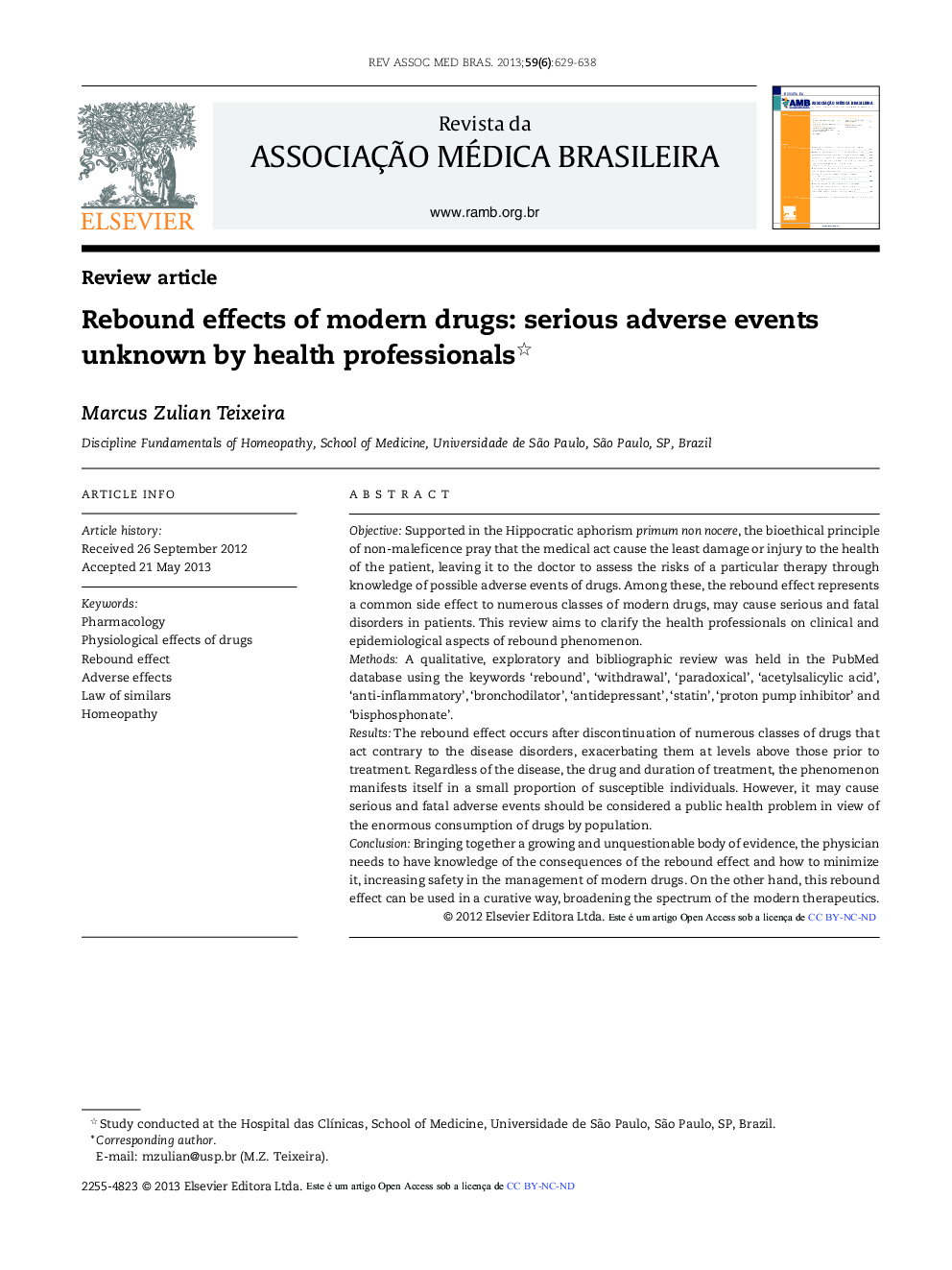| کد مقاله | کد نشریه | سال انتشار | مقاله انگلیسی | نسخه تمام متن |
|---|---|---|---|---|
| 3826667 | 1597805 | 2013 | 10 صفحه PDF | دانلود رایگان |
ObjectiveSupported in the Hippocratic aphorism primum non nocere, the bioethical principle of non-maleficence pray that the medical act cause the least damage or injury to the health of the patient, leaving it to the doctor to assess the risks of a particular therapy through knowledge of possible adverse events of drugs. Among these, the rebound effect represents a common side effect to numerous classes of modern drugs, may cause serious and fatal disorders in patients. This review aims to clarify the health professionals on clinical and epidemiological aspects of rebound phenomenon.MethodsA qualitative, exploratory and bibliographic review was held in the PubMed database using the keywords ‘rebound’, ‘withdrawal’, ‘paradoxical’, ‘acetylsalicylic acid’, ‘anti-inflammatory’, ‘bronchodilator’, ‘antidepressant’, ‘statin’, ‘proton pump inhibitor’ and ‘bisphosphonate’.ResultsThe rebound effect occurs after discontinuation of numerous classes of drugs that act contrary to the disease disorders, exacerbating them at levels above those prior to treatment. Regardless of the disease, the drug and duration of treatment, the phenomenon manifests itself in a small proportion of susceptible individuals. However, it may cause serious and fatal adverse events should be considered a public health problem in view of the enormous consumption of drugs by population.ConclusionBringing together a growing and unquestionable body of evidence, the physician needs to have knowledge of the consequences of the rebound effect and how to minimize it, increasing safety in the management of modern drugs. On the other hand, this rebound effect can be used in a curative way, broadening the spectrum of the modern therapeutics.
ResumoObjetivoApoiado no aforismo hipocrático primum non nocere, o princípio bioético da não maleficência roga que o ato médico cause o menor dano ou agravo à saúde do paciente, incumbindo ao médico avaliar os riscos de determinada terapêutica por meio do conhecimento dos possíveis eventos adversos das drogas. Dentre esses, o efeito rebote representa um efeito colateral comum a inúmeras classes de fármacos modernos, podendo causar transtornos graves e fatais nos pacientes. Esta revisão tem o objetivo de esclarecer os profissionais da saúde sobre os aspectos clínicos e epidemiológicos do fenômeno rebote.MétodosUma revisão qualitativa, exploratória e bibliográfica foi realizada na base de dados PubMed utilizando os unitermos ‘rebound’, ‘withdrawal’, ‘paradoxical’, ‘acetylsalicylic acid’, ‘anti-inflammatory’, ‘bronchodilator’, ‘antidepressant’, ‘statin’, ‘proton pump inhibitor’ and ‘bisphosphonate’.ResultadosO efeito rebote ocorre após a descontinuação de inúmeras classes de fármacos com ação contrária aos distúrbios da doença, exacerbando-os a níveis superiores aos anteriores do tratamento. Independente da doença, da droga e da duração do tratamento, o fenômeno se manifesta numa pequena proporção de indivíduos suscetíveis. No entanto, pode causar eventos adversos graves e fatais, devendo ser considerado um problema de saúde pública em vista do enorme consumo de fármacos pela população.ConclusãoReunindo um corpo de evidências crescente e inquestionável, o médico precisa ter conhecimento das consequências do efeito rebote e de como minimizá-lo, desse modo aumentando a segurança no manejo das drogas modernas. Por outro lado, este efeito rebote pode ser utilizado de forma curativa, ampliando o espectro da terapêutica moderna.
Journal: Revista da Associação Médica Brasileira (English Edition) - Volume 59, Issue 6, January 2013, Pages 629-638
